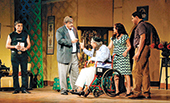 |
| A scene from the Parsi Natak Mamavaji Not Out staged at Gyan Manch on August 20. Picture by Sayantan Ghosh |
At the last count — and that was some time ago — there were 565 Parsis in this city, a once-thriving Westernised community known for its industriousness, integrity and love of the good life. So as usual, the Zoroastrian New Year’s Day or Navroz, Papeti, or Pateti celebrated on Friday, went unnoticed by most people.
The day began with Jashn at 9.30am at the fire temple on Metcalfe Street, where the community gathered for thanksgiving prayers presided over on this special occasion by four priests. The children wore new clothes but it was the bonhomie that mattered most. The sandalwood contributed by individuals on this day started a crackling blaze in the giant urn in which the holy fire is kept alive all the time.
Thereafter they had a community breakfast at the temple when they partook of malido papri, which is basically puri with suji halwa. The prasad known as chasni comprising uncut fruit was also eaten. That was on the house.
They also had akuri, which is an egg dish that is like scrambled eggs, only spiced up with onions and chilli. The breakfast has become more elaborate now. They met at home in the afternoon, and in the evening they went to see the Parsi Natak titled Mamavaji (in other words, maternal grandfather) Not Out that was being staged at Gyan Manch. A second show will be held for the Gujarati community that enjoys these comedies.
Years ago, men played the roles of women but now the mixed-gender cast is getting younger every succeeding year. But the problem is that few good plays are being written. The celebrations ended with the contributory dinner at the Olpadvala Memorial Hall on Chowringhee, where one could pick and choose from the menu.
Earlier, before Bombay Sweets on Bentinck Street had closed shop, a special sweet in the shape of a large fish used to be made on this occasion. The Parsis had adapted many of the ways and the customs of the country they have called their home for more than 500 years. Hence like the Bengalis, they consider fish auspicious as well.
The piscine motif is prominent in the delicate chalk powder rangoli or chawk, as Parsis call it, on the floor outside the entrance of every Parsi household. This, along with the toran or garland of flowers on the door, are meant to usher in the new year.
Futuristic India
Politician-turned-author Karan Singh’s futuristic vision has been turned into a documentary. The veteran Congressman was in the city to launch the DVD of I Believe: Universal Values for Global Society, based on his book I Believe: A Philosophy for the Global Society at Oxford Bookstore on August 16. At the event, hosted in association with Universal Quest, Singh was in conversation with Raja Choudhury, the director and producer of the 40-minute documentary that explores the politician’s radical vision of the future India, planet, humanity and the universe. It deals with diverse subjects like divinity within mankind, poverty, death, the cosmic destiny of mankind, modern spirituality and relationships.
No London, please
 |
A man on his way to Kanak Building on Jawaharlal Nehru Road was stuck in the morning rush-hour traffic jam near Shakespeare Sarani. Sitting inside his taxi, he cursed the one-way traffic system, but its driver chose to get conversational. He had a series of queries for his guest.
Taxi driver: Bhaiya Kalkatta kya Kalkatta-London ho jayega (Will Calcutta be renamed Calcutta-London)?
Passenger: No, why do you ask?
Taxi driver: Everybody is saying so. So I asked.
Passenger: What they mean is Calcutta will be like London after the riverfront gets a facelift.
Taxi driver: Good. Otherwise I would not have been able to invite my relatives here.
Passenger: Why?
Taxi driver: Bihar ka ladka log jab tak Kalkatta nahi aate hain to aisa lagta hai ki woh apni ma ke pet se hi nahi nikla hai. Agar Kalkatta, Kalkatta-London ho jata toh woh to ma ke pet se nikalte hi udne lagta (If a boy from Bihar does not visit Calcutta, he behaves as if he hasn’t seen life. But if Calcutta turns into Calcutta-London then they will start flying the moment they are born).
He said he had sent three of his brothers, who were in Calcutta, to Delhi, Chennai, and Mumbai, because all of them were running after women and doing nothing.
He pointed at the columns of working women turning around the corner of Park Street and reaching Jawaharlal Nehru Road. He also spoke of a friend who was working in a garage but lost his job because he wouldn’t take money from women customers after repairing their cars.
He feared that in the new Calcutta-London such tendencies would only increase. Now he was thankful that such a thing was not to happen.
(Contributed by Soumitra Das and Sambaran Mitra)











